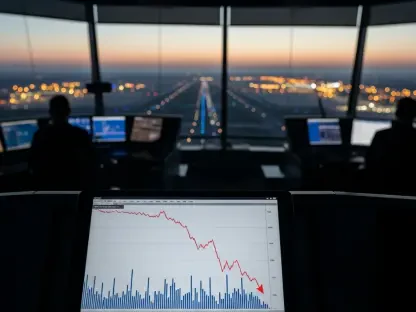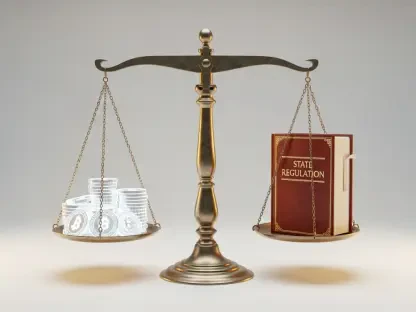The European Union has set an ambitious target to slash greenhouse gas emissions by 90% by 2040, a decision finalized just before the COP30 summit in Brazil, sparking intense debate across environmental, political, and economic spheres. With global climate negotiations looming, the stakes couldn’t be higher for the EU to prove its leadership on this critical issue. This roundup gathers diverse opinions from various stakeholders—environmental advocates, policymakers, industry leaders, and international observers—to dissect whether this target is a genuine step forward or a compromised gesture. The purpose here is to present a balanced view of the EU’s climate strategy and its implications for the global stage.
Unpacking the EU’s Climate Commitment: A Spectrum of Opinions
Environmental Advocates: Bold Target or Diluted Ambition?
Environmental groups have expressed mixed feelings about the EU’s 90% emissions reduction goal. Many acknowledge the significance of setting such a high benchmark, noting that it sends a strong signal to other global players. However, a recurring critique centers on the flexibilities embedded in the plan, such as allowing up to 10% of reductions to be met through foreign carbon credits. Critics argue this loophole risks undermining accountability, as it potentially shifts the burden of actual cuts outside the bloc.
Beyond the carbon credit concern, there’s frustration over the delayed rollout of a new carbon market to 2028. Several advocacy organizations highlight that such postponements could slow momentum at a critical time. They urge tighter regulations to ensure that the target isn’t just a symbolic gesture but translates into tangible, on-the-ground reductions within the EU’s borders.
A further point of contention is the biennial reassessment clause, which some environmentalists fear could water down the commitment over time. While acknowledging the political necessity of compromise, they stress that the EU must prioritize stricter enforcement mechanisms to maintain credibility at international forums like COP30.
Policymakers: Balancing Climate Goals with Economic Realities
Among policymakers within the EU, opinions reflect a pragmatic approach to the 2040 target. Supporters of the deal emphasize the importance of securing agreement from at least 15 of the 27 member states, a threshold that was narrowly met despite opposition. They argue that incorporating flexibility, such as the use of foreign carbon credits, was essential to accommodate nations with heavy industrial bases and economic constraints.
Dissenting voices from countries like Poland and Hungary reveal a different perspective, focusing on the potential economic fallout of stringent climate rules. Representatives from these nations contend that rapid decarbonization could jeopardize jobs and competitiveness, especially in sectors reliant on fossil fuels. Their stance underscores a broader tension within the bloc about prioritizing environmental goals over immediate financial stability.
Despite these divisions, there’s a shared recognition among policymakers that the EU must present a united front at COP30. Many stress the need for ongoing dialogue to address internal fractures, suggesting that future reassessments of the target could serve as opportunities to strengthen resolve rather than dilute it. This balancing act remains a central theme in political discussions.
Industry Leaders: Competitiveness Versus Green Transition
Industry perspectives on the EU’s climate target highlight a deep concern for maintaining economic competitiveness. Leaders from manufacturing and energy sectors appreciate the flexibility in the agreement, arguing that allowances like delayed carbon market implementation provide breathing room for adaptation. They view these concessions as critical to preventing an exodus of businesses to less regulated regions.
However, some industrial stakeholders caution that even with these compromises, the 90% reduction goal could strain smaller enterprises unable to invest in green technologies at the required pace. They advocate for more robust financial support and incentives from the EU to ease the transition, warning that without such measures, the target might lead to unintended economic consequences.
A contrasting opinion within the business community comes from renewable energy sectors, which see the target as a long-overdue push toward innovation. These leaders argue that ambitious climate goals, even with caveats, can drive investment in sustainable solutions, positioning the EU as a hub for green technology if supported by clear policies and funding.
Global Reactions: How COP30 Frames the EU’s Role
International Observers: Leadership Under Scrutiny
On the international stage, reactions to the EU’s climate plan vary widely as COP30 approaches. Many observers from developing nations and climate justice groups point out that while the 90% target is commendable, it falls short of addressing historical responsibilities. They argue that reliance on mechanisms like carbon credits sidesteps the need for direct accountability and reparations for communities disproportionately impacted by climate change.
Another perspective from global policy analysts focuses on the EU’s shifting role as a climate leader. With rising economic and geopolitical challenges, including skepticism from major economies like the U.S., some suggest that the EU’s pragmatic turn might reflect a broader recalibration of priorities. They question whether the bloc can still inspire collective action or if its influence is waning amid internal divisions.
A more optimistic view comes from international environmental networks, which see the EU’s target as a potential catalyst at COP30. They believe that despite its flaws, the commitment could pressure other nations to elevate their ambitions, provided the EU demonstrates transparency in implementation and addresses equity concerns raised by vulnerable populations.
Climate Justice Advocates: Equity Over Numbers
Climate justice groups have been vocal in framing COP30 as a platform for equity, not just emissions targets. Their perspective on the EU’s plan centers on the need for reparative measures tied to historical injustices like colonialism and disproportionate climate impacts. They critique the 2040 goal for lacking a clear commitment to financial and structural support for affected regions.
These advocates also highlight the risk of carbon credit reliance perpetuating global inequities, as it may allow wealthier nations to offset responsibilities rather than reduce emissions domestically. Their call is for the EU to lead by example, integrating justice into its climate policies rather than focusing solely on numerical targets.
A key insight from this group is the demand for inclusive dialogue at COP30, where the voices of marginalized communities shape outcomes. They urge the EU to use its platform to champion a holistic approach, ensuring that climate action addresses systemic inequalities alongside environmental goals.
Reflecting on Diverse Views and Looking Ahead
Looking back on the varied opinions surrounding the EU’s 90% emissions cut by 2040, it is clear that while the target represents a significant milestone, it also exposes deep divisions and unresolved challenges. Environmentalists push for stricter enforcement, policymakers grapple with economic trade-offs, industry leaders seek support for transition, and global voices demand equity. These perspectives paint a complex picture of ambition tempered by pragmatism, with COP30 serving as a critical test of resolve.
Moving forward, actionable steps emerge from the discourse, including tightening loopholes in carbon credit usage to ensure accountability and fostering stronger consensus among EU member states through targeted economic incentives. Additionally, engaging with climate justice demands could position the EU as a true leader in equitable action. Monitoring how these issues unfold post-COP30 offers a chance to assess whether the bloc can reclaim its pioneering role or needs to adapt to a more balanced, pragmatic stance in global climate efforts.









